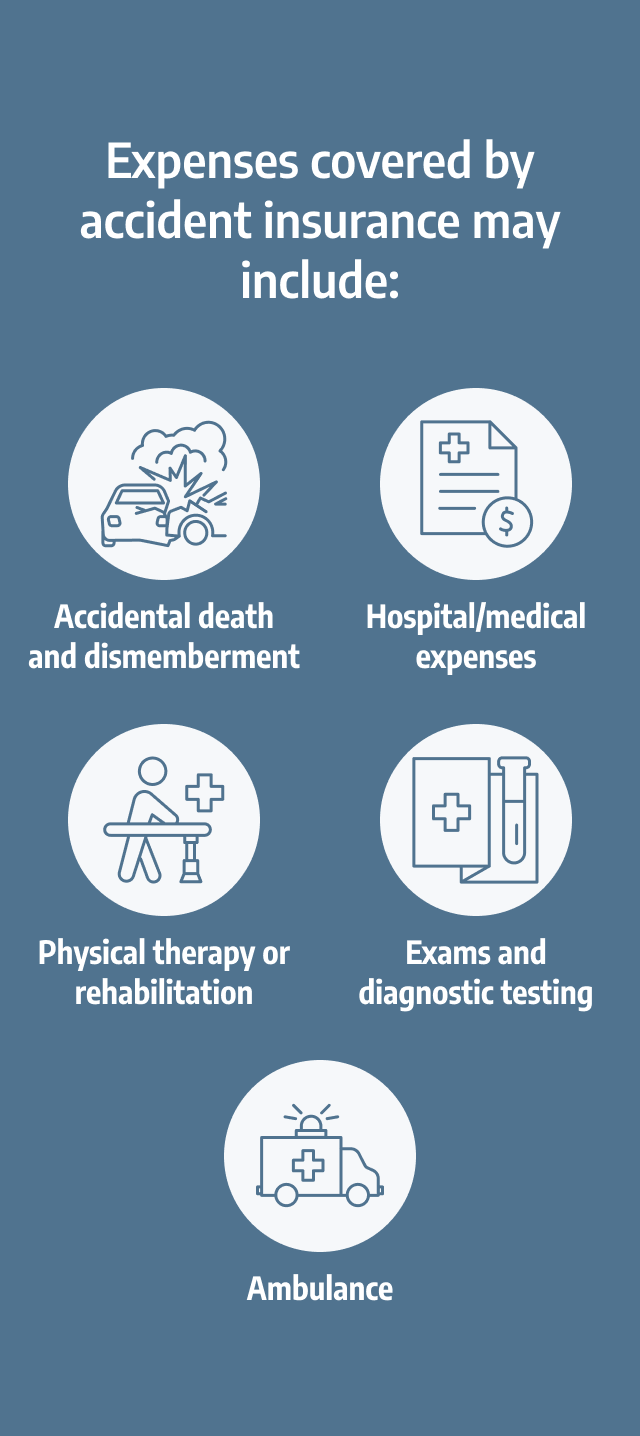Home > Supplemental Insurance > Accident Insurance
See your accident insurance coverage options.


Accident insurance has you covered when the unexpected happens
In the event of an accidental injury, an accident supplement will reimburse the insured up to the amount of the claim (less the deductible) or the benefit maximum on the accident supplement, whichever is smaller. The funds can then be used to pay the deductible on the major medical plan.
What is accident insurance?
Accident insurance is a type of insurance that pays cash benefits, up to a predetermined limit, if the policy holder experiences an accidental injury that’s covered by the plan. Accident insurance is designed to supplement major medical health insurance.


Frequently asked questions about accident insurance
What does accident insurance cover?
Accident insurance policies vary in terms of their specific benefits. But in general, they will pay up to a certain predetermined amount when the insured submits proof of medical treatment related to an accidental injury.
The type of accidental injury covered by these policies runs the gamut from a sprained ankle or a cut that requires a few stitches, all the way to a severe injury that results in a coma or paralysis. Accident insurance policies come with a list of exclusions, detailing circumstances in which they will not provide benefits. (These vary from one policy to another.) But other than those exclusions, any sort of accidental injury that requires medical care can potentially result in a payment from an accident insurance policy, depending on the policy specifics.
How does accident insurance work?
Unlike most major medical health plans, accident insurance policies pay benefits directly to the insured, rather than to a medical provider.
The specifics vary from one plan to another, but you’ll generally need to submit proof that you received medical care for an accidental injury that’s covered by your policy. Once the claim is processed, the accident insurance company will send you a check for the amount you’re owed. The payment amount will depend on the type of injury, the costs you incurred, and the parameters of the policy you have.
Some accident insurance policies will pay a lump sum, regardless of your out-of-pocket costs. Others will pay no more than the actual out-of-pocket costs you incur, up to the policy’s pre-determined limits. Some policies pay the entire benefit amount up front, when the initial claim is filed, while others spread payments out over time as additional follow-up treatment (eg, physical therapy) is received.
Why would I need accident insurance?
Would it be difficult for you to pay the out-of-pocket costs under your major medical coverage in the event of an accidental injury? If so, an accident policy – which pays you cash in the event of a covered accidental injury – might be a great supplement to your health coverage.
If a person is in good health, they may feel confident with a major medical plan that has a high deductible and high out-of-pocket limit, as they may assume that they are unlikely to need to use their coverage for extensive medical care. But accidental injuries can happen to even the healthiest person, and they can result in substantial out-of-pocket medical costs.
Even if your medical coverage is very robust, you might find that a personal accident insurance policy can still provide additional peace of mind. If you experience an accidental injury, you might have to miss work, travel to see medical specialists, or purchase equipment to use in your home while you’re recovering. Although it varies depending on the accident insurance policy, you may find that the cash payout can be used to offset these costs, in addition to direct out-of-pocket costs for medical treatment.
What doesn't accident insurance cover?
Accident insurance policies will not pay benefits if the claim is the result of an illness or pre-existing condition. And there are often exclusions for injuries stemming from natural disasters, certain risky activities, work-related circumstances, self-inflicted injuries, pre-existing injuries, etc.
Some accident insurance policies include additional benefits, such as accidental death and dismemberment coverage or discounts on prescriptions.
How do I choose the best personal accident insurance for my needs?
Consider premiums.
How much can you spend on the monthly premium? Do you prefer a more extensive/lenient benefit in trade for generally higher premiums, or a more limited benefit with lower premiums?
Weigh your options.
Would it make more sense to spend more money to get a more robust major medical health policy – and skip the accident insurance – or would your total premiums and/or potential out-of-pocket exposure be lower by combining a higher-deductible health plan with an accident insurance policy?
(This will vary depending on the sort of medical care you expect to need, and whether you’re eligible for an employer’s health plan or a subsidy in the ACA Marketplace.)
Know your plan’s limitations.
You’ll want to be very clear in understanding what’s covered and how much the plan will reimburse for various injuries. For instance, will it cover an injury sustained during an organized sports practice/game or various recreational activities?
What companies offer accident insurance?
There are numerous companies that offer accident insurance that can be purchased by individuals and families. Some examples are Aflac, United Healthcare, Wholesale Benefits Association, Anthem, MetLife, Guardian Life Insurance, AIG, and Globe Life.
Some accident policies can be purchased directly from the insurer’s website, while others will require you to work with a health insurance agency or brokerage.
Can I have accident insurance if I have HSA-qualified health insurance?
Yes. If you have an HSA-qualified high-deductible health plan (HDHP), you’re allowed to contribute tax-free money to a health savings account (HSA). In most cases, you cannot contribute to the HSA if you have other health coverage in addition to the HDHP. But the IRS allows people with HDHP coverage to contribute to an HSA even if they also have various types of supplemental coverage — including supplemental accident insurance.
How is accident insurance different from health insurance?
Accident insurance plans typically pay benefits directly to the insured – as opposed to major medical health plans, which generally send payments to medical providers.
How much does accident insurance cost?
Monthly premiums can vary from just a few dollars per month to more than $50/month, depending on the scope of the coverage. In general, the more limited the benefits, the lower the monthly premiums. But there is variation from one plan to another, so it’s worth getting multiple quotes before selecting a policy.
Does accident insurance have coverage limits?
Yes. Accident plans have benefit caps. Some of them use a single benefit cap for any type of accident that results in a need for medical treatment. But it’s more common to see specific lists of the types of injuries and medical treatment they’ll cover, and benefit caps for each service.
For example, a plan might pay up to $500 for an ambulance ride, up to $250 for an emergency room visit, and up to $2,000 for a hospital admission. (Those are just examples. The details will be specified by each plan.) It’s also common to see benefit limits that vary for a specific type of injury, such as a bone fracture (where it is and how bad the break is) or burn (percentage of the body that’s affected and the degree of the burn).
Louise Norris is an individual health insurance broker who has been writing about health insurance and health reform since 2006. She has written dozens of opinions and educational pieces about the Affordable Care Act for healthinsurance.org.

Looking for more information about supplemental options?
Is supplemental coverage right for you?
Supplemental coverage – such as accident insurance, critical illness insurance and travel insurance – can pick up where major medical leaves off.
Speak to a licensed insurance agent at one of our agency partners.
Footnotes
- All Injuries. injuryfacts.nsc.org. Accessed September, 2024. ⤶
- Fracture. lvhn.org, Accessed October, 2024. ⤶
- Trends in Nonfatal Falls and Fall Related Injuries. cdc.gov, Accessed October, 2024. ⤶

